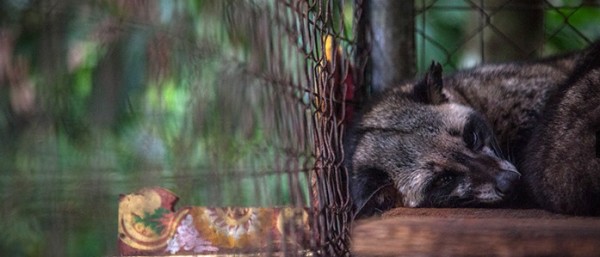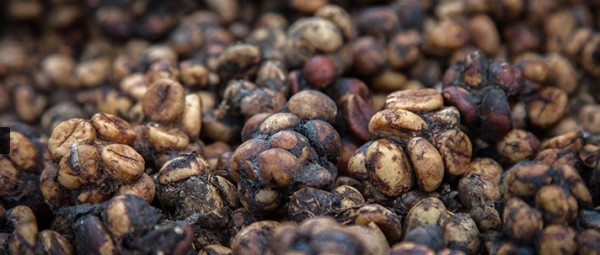
Caged civets are prone to odd behavior such as pacing and self-mutilation. Photo by Nicky Loh for WSAP.
The London-based World Society for the Protection of Animals (WSPA) is calling for an end to the caging of wild, cat-like civets used in the production of Kopi Luwak, saying the animals when caged are prone to abnormal behavior like pacing and self-mutilation.
Demand for the coffee, which can fetch upwards of $150-per-pound to retail consumers, has been growing worldwide, with many news outlets speaking of it as a kind of fun foodie novelty (the coffee beans are removed from the excrement of the cat-like civet). Yet other sources have reported widespread caging and poor treatment of the wild animals.
“Behind the world’s most expensive coffee are huge animal welfare issues”, the WSPA said in a statement released Sept. 13, after the organization viewed footage of civet treatment in Southeast Asia from BBC News. “The footage we have seen of these caged civet farms is shocking. These animals belong in the wild and should not be needlessly captured and caged.”
Related Reading
Scientists Create Method to Verify Kopi Luwak Authenticity
Thai Resort Selling Elephant Dung Coffee for $50 a Cup
The WSPA does recognize that some kopi luwak is produced naturally, with beans being gathered in the wild, but suggests that too many animals are now being caged and neglected. The organization also cited conservation concerns for the civets (several species have been found to produce kopi luwak).
“The evidence WSPA has been presented shows large numbers of civets demonstrating signs of great stress and suffering. Confined to typically tiny, barren cages with nothing to sleep or hide in, their basic needs are completely neglected,” the group said. “Unable to cope with the frustration, fear and stress of living in such unsuitable conditions, they demonstrate abnormal and often harmful behaviours such as pacing and self-mutilating. The civets are captured from the wild using cruel methods and often suffer from injuries, infections, disease and premature death. They are fed a restricted diet of coffee cherries to meet the growing global demand for this luxury product.”

coffee beans dry in civet excrement before they are harvested by humans. Photo by Nicky Loh for WSPA.
Part of the WSPA’s goal is to move toward an industry-wide “cage-free” certification system, that will allow distributors and consumers to verify the natural and sustainable production of kopi luwak coffee. The group put out a four-pronged proposal for moving away from the caging of more wild animals:
Check out the cage-free chain: Retailers to pledge to only source ‘cage free’ civet coffee and remove inhumane products from their shelves. Retailers believing their civet coffee already comes from wild, ‘cage-free’ sources are urged to scrutinise their supply chains and obtain proof that this is the case.
Certification of wild sourcing: WSPA would like to see the introduction of an accredited certification scheme as standard for humane ‘cage-free’ civet coffee. We are urging retailers to lend their support and engage with certification bodies as well their suppliers to push for the development and enforcement of a humane chain.
Improved government oversight and enforcement: The governments of civet coffee producing countries can support cage-free production initiatives that protect civet welfare, the future of the species and the livelihoods and well-being of local communities. Governments can also take steps towards ending the caged production of civet coffee and take urgent action to regulate and limit the removal of civets from the wild.
Choose cage-free civet coffee: Whether at home or abroad, only buy civet coffee that has not involved the capture and containment of wild civets. If a retailer cannot guarantee it is from a 100 per cent cage-free source, then don’t buy it.
Nick Brown
Nick Brown is the editor of Daily Coffee News by Roast Magazine.
Comment
2 Comments
Comments are closed.






Such a shame that it has taken so long. And that even now they are not prepared to demand the total banning of this sort of animal abuse.
This is such an appalling and inhumane practice and MUST be stopped